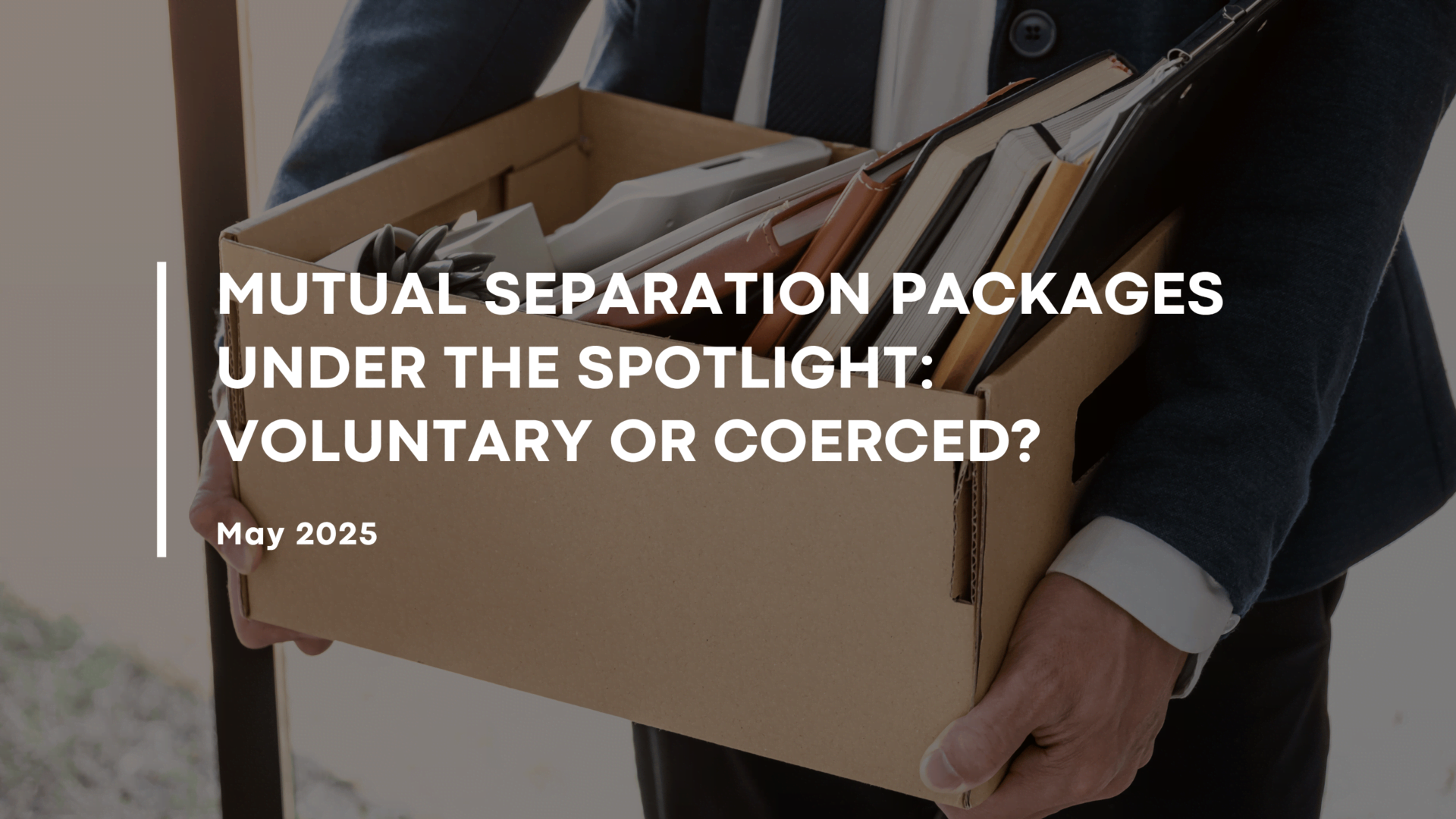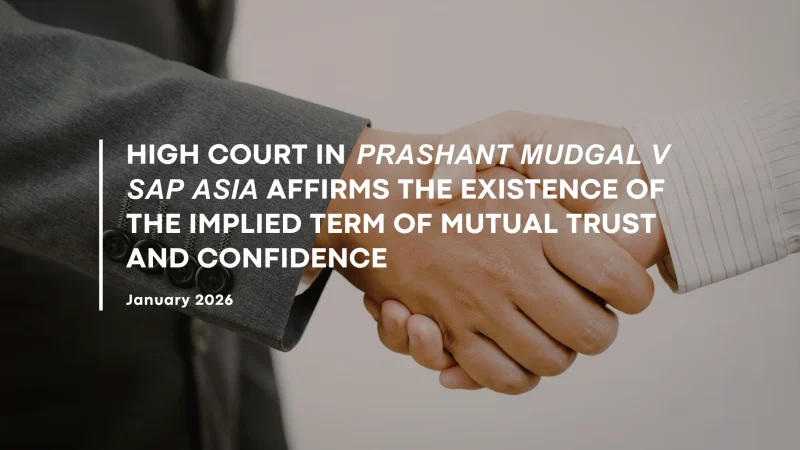With the evolving nature of work and increasing organisational restructuring, many employers have turned to mechanisms such as Voluntary Separation Schemes (VSS), Mutual Separation Schemes (MSS), or Mutual Exit Packages (MEPs) to manage workforce changes pragmatically. However, what is documented as a mutual agreement can sometimes become contentious, particularly when employees claim they were left with no genuine choice but to accept the terms. This has led to heightened scrutiny by the Industrial Court, which must carefully assess whether such exits are truly voluntary or effectively amount to dismissals in disguise. This article examines a recent decision explaining the Court’s approach to these claims and offering key takeaways for both employers and employees.
A. Introduction
In Malaysia, employers are increasingly adopting Mutual Exit Packages (MEPs) as a strategic tool to manage workforce restructuring, reduce disputes, and circumvent formal retrenchment processes. These arrangements are typically framed as amicable separations designed to preserve employee dignity and avoid protracted industrial litigation. Positioned as a win-win solution, MEPs allow employees to exit gracefully while minimising the risk of lengthy disputes. However, the distinction between voluntary separation and constructive dismissal can become blurred when employees later assert that their acceptance of the MEP was made under duress. The Industrial Court is often tasked with determining whether such exits are genuinely mutual or, in effect, disguised dismissals.
This article examines a recent Industrial Court ruling involving six claimants who contested their MEPs as involuntary. It explores the Court’s reasoning and the legal principles that both employers and employees should bear in mind when negotiating these types of exits.
B. Industrial Court Case No.: 5/4-1448/20, Award No.: 814 of 2025
There are six (6) Claimants who brought claims of unfair dismissal against the Company. Their cases were heard together due to identical facts and similar issues to be determined.
The Claimants claimed that the circumstances surrounding the offer and acceptance of the MEP effectively amounted to dismissal, as they had no viable alternative but to accept the package.
In response, the Company asserts that no dismissal occurred. Instead, the employment relationship ended by virtue of the Claimants’ voluntary acceptance of the MEP. The Company insists the exit was genuinely mutual, free from coercion or undue pressure. The acceptance documents do not reflect any compulsion, and at no point did the Claimants express grievances or complaints about being forced to sign the mutual exit letters. Furthermore, from the date of acceptance to the date payments were made into the Claimants’ bank accounts, no evidence indicates that the Claimants were coerced or threatened into signing.
After considering the documentary evidence, oral testimony, and relevant legal principles, the Court finds that the Claimants’ allegations of constructive dismissal are unsupported both factually and legally.
C. Key Considerations for the Court in Deciding in Favour of the Employer
1. Clear and Unambiguous Acceptance of the MEP – The tone and content of the Claimant’s communications demonstrate conscious and deliberate decision-making rather than a reaction to forced agreement, coercion, or undue pressure. There is no evidence of compulsion, threat, or misrepresentation at the time of acceptance.
2. Absence of Objections or Protests – From the date of acceptance until the receipt of severance benefits, the Claimant did not raise any formal complaints alleging she was forced, misled, or pressured into signing the mutual exit documents. No grievances, appeals, or internal protests were lodged. Additionally, the Claimant did not qualify her acceptance as being “under protest” or “without prejudice.”
3. Claimant’s Familiarity with Human Resource Processes – It is particularly relevant that the Claimant is a human resource professional, well-acquainted with restructuring processes, exit mechanisms, and dismissal procedures. The Court accepts the Company’s position that the Claimant was in an advantaged position to make informed decisions, given her professional background. This familiarity considerably weakens any claim of ignorance regarding the consequences of signing the mutual exit letter.
4. Reasonable Timeline for Consideration – The Court finds that the timeline provided from 18 October to 25 October 2019 and to 19 November 2019 constituted a reasonable and adequate period for the Claimant to consider the MEP. During this time, the Company also arranged one-on-one meetings to explain the available options. This approach aligns with established case law, such as Suresh K Velauthan v. Petronas ICT Sdn. Bhd. [2019] 2 ILR 345, where the Industrial Court held that a period of five days was sufficient to evaluate a mutual separation package. Therefore, the timeline afforded to the Claimant was reasonable and appropriate.
5. Legal Recognition of Mutual Termination – The law recognises three distinct categories of employment termination, as set out in Thilagavathy SR Canagasingam v. Ambank (M) Berhad [2007] 3 ILR 215; [2007] 2 MELR 16:
a. Termination by the employer (dismissal with or without cause);
b. Termination by the employee (resignation or constructive dismissal)
c. Mutual termination (voluntary agreement between parties), where both employer and employee consent to end the contractual relationship, and no dismissal occurs.
D. Key Takeaways
For Employers
The key takeaway for employers from this case is that the process matters just as much as the documentation. Even a clearly written and legally sound Mutual Exit Package (MEP) can be successfully challenged if the manner in which it is presented appears rushed, coercive, or lacking transparency. It is insufficient to rely solely on signed documents. Based on our experience, employers must be able to demonstrate that the process was conducted fairly and voluntarily.
Employers should tailor the MEP process to the profile of the employee. Junior employees or those less familiar with HR procedures may require more explanation, time, and safeguards to make informed decisions. Conversely, senior employees or those with HR or legal experience will be held to a higher standard of understanding. In all cases, clarity of communication and a respectful approach are essential.
A reasonable decision-making window must be provided. While the Industrial Court has accepted even a five-day period as adequate, this is only justifiable if accompanied by transparent communication, access to relevant information, and the opportunity for employees to ask questions. The key is to provide meaningful space for consideration, not merely the appearance of choice.
Most importantly, MEPs should never be framed as “ultimatums”. Presenting an MEP with the implication that refusal will result in immediate termination undermines the spirit of mutuality and it may be recharacterised as a dismissal. The offer should come with clear assurances that it is one of several available options, not a disguised threat.
Finally, seeking legal advice throughout the process is crucial for employers to ensure compliance with employment laws, mitigate risks, and structure the MEP appropriately. Proactive legal guidance can help safeguard the fairness and enforceability of mutual exit agreements.
For Employees
For employees, the most important lesson is to recognise that silence or inaction can be interpreted as acceptance. If there is any sense of coercion, pressure, or ambiguity regarding the terms of an MEP, it is crucial to document these concerns contemporaneously. Raising objections early or seeking clarification is far more effective than attempting to challenge the agreement subsequently.
Employees may also protect their rights by signing an MEP “under protest” or explicitly stating that acceptance is conditional or unwilling. Ideally, employees should seek independent legal advice before signing, especially where the circumstances are uncertain or the stakes are high.
Ultimately, employees must understand that once an MEP is accepted, particularly if compensation has been received without protest, it becomes difficult to sustain a claim of constructive dismissal. The Court
will consider the totality of conduct, and where there is no clear evidence of pressure or coercion, voluntariness will generally be presumed.
© TSL Legal
This article is intended to provide general information only and does not constitute legal advice. It should not be used as a substitute for professional legal consultation. We recommend seeking legal advice before making any decisions based on the information available in this article. TSL Legal fully disclaims responsibility for any loss or damage which may result from relying on this article.
Further information
If your business requires tailored advice on retrenchment or a mutual separation scheme, please contact the following representative for further assistance:

